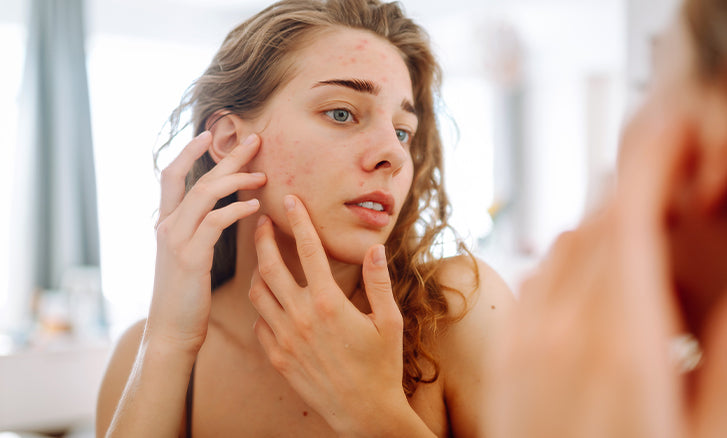Transitioning your Skincare Routine from Summer to Monsoon: Tips for Acne-Prone Skin
As the seasons change from summer to monsoon, so do our skincare needs. The transition from summer to monsoon brings about shifts in weather patterns, humidity levels, and environmental factors that can impact our skin, particularly for those with acne-prone skin. Understanding these changes and adjusting our skincare routines accordingly is crucial to maintaining healthy, clear skin throughout the year.
Understanding the Impact of Weather on Acne
Summer's heat and humidity can exacerbate acne by increasing oil production, sweating, and clogging of the pores. The combination of sweat and sebum creates an ideal environment for bacteria to thrive, leading to breakouts. When talking about sebum, a study found that every 1° rise in temperature causes a 10% increase in secretion of sebum. Additionally, use of certain sunscreens and moisturizers during summer can contribute to more clogging and further development of acne. On the other hand, monsoon weather presents its own set of challenges for acne-prone skin, including excess humidity that can further contribute to acne flare-ups. These shifts in weather patterns highlight the need for proactive skincare adjustments.

Assessing Your Skin's Current Condition
Before making any changes to your skincare routine, it's essential to assess your skin's current condition. Look out for signs that indicate the need for adjustment, such as increased oiliness, dryness, Or sensitivity.
Summer to Monsoon Transition: Common Skin Problems
During the transition from summer to monsoon, acne-prone skin may experience an array of issues. Breakouts caused by sweat and humidity are common, as well as sun damage from prolonged sun exposure during the summer months. Additionally, dehydrated skin may lead to irritation, tightness, and pain. Understanding these common skin problems is key to developing an effective skincare strategy.

Adapting Your Cleansing Routine
To combat the effects of sweat and humidity, consider switching to a gentle cleanser suitable for both oily and dehydrated skin. Double cleansing can help remove excess oil, dirt, and impurities that can clog pores and lead to breakouts. But what is this double cleansing? Double cleansing involves thoroughly washing your face with two cleansers— Both of which work to remove oily impurities such as sunscreen, sebum, and pollution and water-based impurities like grime and sweat, ensuring a thorough and deep clean. While double cleansing might sound like a good option, do dermatologists recommend it? Double cleansing isn’t a step that most dermatologists recommend. Washing your face twice can do more harm than good, leading to dryness, irritation, and a compromised skin barrier. If you’re looking for a way to help remove all the makeup, there’s another option. Using a micellar water to remove makeup before a water-based cleanser is a great alternative to double cleansing. Incorporating exfoliation into your routine is also essential for preventing the build-up of dead skin cells and keeping pores clear.
Choosing the Right Moisturizer
Opt for lightweight, non-comedogenic moisturizers to lock moisture in your skin to avoid clogged pores and thus acne. Moisturizers work by creating a seal on the surface of the skin that prevents water from escaping. They also prevent dehydration of the skin and make the skin appear smoother. Look for a moisturizer with both humectants and occlusive, to hydrate your skin and then safely lock that moisture in the skin.
Sun Protection during Monsoon
Even during cloudy skies, about 80% of harmful UV rays can still penetrate through and cause damage to the skin. It's a common misconception to skip sunscreen during the monsoon season, but it's essential to protect your skin year-round. Choose water-resistant sunscreen options specifically formulated for acne-prone skin, and ensure they offer broad-spectrum protection against both UVA and UVB rays and have an SPF of 30 and higher.

Dietary Adjustments for Healthy Skin
Your diet plays a significant role in the health of your skin. Include foods rich in antioxidants, healthy fats, vitamins, and those enhancing hydration to promote clearer skin year-round. Opt for water-rich fruits and vegetables like cucumber, watermelon, and leafy greens to stay hydrated from the inside out. Avoid foods that can exacerbate acne, such as sugary treats, processed foods, and dairy products.
Conclusion
Transitioning your skincare routine from summer to monsoon is essential for maintaining clear, healthy skin, especially for those prone to acne. By understanding the impact of weather on your skin and making necessary adjustments, you can effectively manage common skin problems and enjoy radiant skin year-round. Take proactive steps in adjusting your skincare routine to ensure optimal skin health and confidence.
